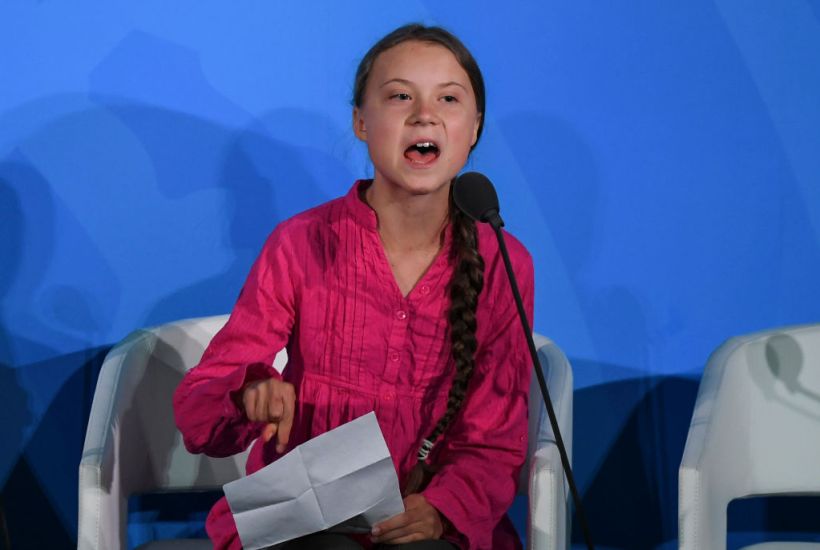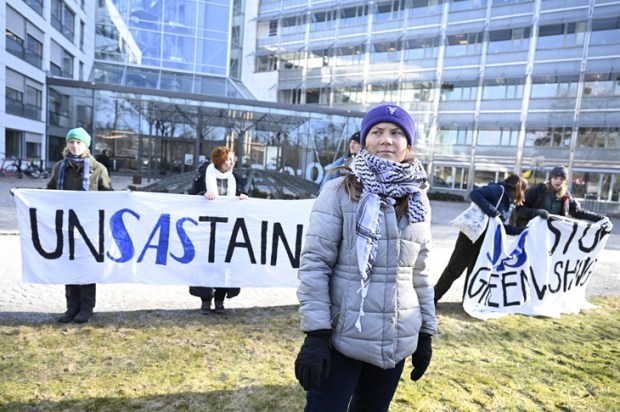According to the United Nations – and Greta Thunberg – four million people around the world, mostly students who walked out of schools, rallied and marched against climate change last Friday, apparently making it the largest environmental protest in history. Whether these figures are correct or not, it’s clear that the environmental causes stirs and motivates a lot of people, if mostly in the developed world.
The portrayal of climate change as an existential threat to humanity, which is a case of rhetoric outrunning the “consensus” science, only adds to the passion and the sense of urgency by those who come onto the streets to wave their placards. The opportunity to skip school also doesn’t harm the cause; if doubtful, I welcome you to try to organise a student protest in their own spare time.
Fighting “climate change” is a very broad umbrella. What does the Global Climate Strike actually stand for? Greta Thunberg’s (I jokingly referred to her as St Joan of Arc of the Children’s Crusade against Carbon, but the marchers in Paris did carry a poster of Thunberg as a saint) initiative does not offer any extensive manifestos or programs on its website, perhaps not unexpectedly for a child-centric project, but it does provide a brief answer to the question “What are you [as a participant asking for?”:
The climate crisis is an emergency – we want everyone to start acting like it. We demand climate justice for everyone. Our hotter planet is already hurting millions of people. If we don’t act now to transition fairly and swiftly away from fossil fuels to 100 per cent renewable energy for all, the injustice of the climate crisis will only get worse. We need to act right now to stop burning fossil fuels and ensure a rapid energy revolution with equity, reparations and climate justice at its heart [emphasis in the original].
It’s not much, but already more than a great majority of those taking part are probably aware of they were striking for.
The call for the complete elimination of fossil fuels and the full transition to 100 per cent renewable energy by 2030 (the date is not mentioned in the above answer but figures everywhere else through Thunberg’s pronouncements) goes beyond – and when I say “beyond” I mean light-years beyond – anything seriously proposed by any of the international agreements like Kyoto and Paris, which talk in a more realistic way about lowering emissions.
The absolutist call for a “rapid energy revolution” betrays a complete ignorance of economics, technology and, well, basic realities of life, and can only be genuinely held by children and socialists, the former who don’t know any better and the latter who should but never do.
The problems and challenges of switching completely from coal, oil and gas to solar, wind and other green sources in the space of a decade or so are so numerous that a few most obvious ones will suffice for the purposes of this discussion: firstly, at this point in time, renewables are more expensive and less reliable than fossil fuels, which can’t provide base power – switching wholly to them would send power prices through the roof, which together with the intermittency of supply, would crash the global economy; secondly, the technology doesn’t yet exist to run transport systems on renewables; thirdly, the traditional energy sources are so deeply embedded in every aspect of our modern civilisation there is simply no sufficient technological, industrial and financial capacity in the world to replace them in a short order.
For the record, I do agree that a world run on 100 per cent renewables would be great and I hope it comes to fruition one day, but it will require a hell of a lot more scientific and technological progress to make the renewables economical and practical. We will get there, but it will certainly take more than 11 years to achieve.
What of the other aspects of the Global Climate Strike’s five-sentence program? What exactly is “climate justice”? And what the hell are the “reparations” in this context?
The Strike site doesn’t provide answers, but “climate justice” in the last sentence hyperlinks to the website for The People’s Demands for Climate Justice, which explains itself as:
Collectively shaped by people’s movements around the world, these demands are an international statement rooted in southern movements, and with input from numerous climate justice organizations and people’s movements around the world. The People’s Demands lays out a vision for a truly just international climate policy. We must ensure the demands of people, not the fossil fuel industry and other Big Polluters, is what is [sic] centered.
While the Global Climate Strike is neither a “convening” nor an “endorsing” organisation, the 403 groups who are, by linking to it, clearly subscribe to the People’s Demands’ vision, some of which includes:
Support global efforts for a just and equitable transition that enables energy democracy, creates new job opportunities, encourages distributed renewable energy, and protects workers and communities most affected by extractive economies…
Adopt a technology framework that recognizes the importance of endogenous and indigenous technologies and innovations in addressing climate change, and enables developing countries and communities to develop, access, and transfer environmentally sound, socially acceptable, gender responsive and equitable climate technologies.
Respect and enable non-corporate, community-led climate solutions that recognize the traditional knowledge, practices, wisdom, and resilience of indigenous peoples and local communities, and protect rights over their lands and territories…
Developed countries must make new concrete pledges of public climate finance accompanied by a definite timeline for delivery.
Commit to climate reparations to those most affected but least responsible for climate change.
In addition to fossil fuels, the People’s Demands are also against any market mechanisms to reduce emissions (like emission trading schemes), carbon offsets, carbon sequestration technologies, geoengineering and other “techno-fixes”, nuclear power, biofuels and use of biomass to generate energy, and large scale hydro projects – in other words most of the potential solutions accepted by the serious mainstream climate change political-scientific consensus.
This pretty much leaves only solar and wind, geothermal in a few lucky places (like Iceland, which is sitting on top of volcanoes) and small scale hydro to power the entire world post-2030. In other words, a complete fantasy world of green Luddites.
Overall, the “demands” can be charitably described as the old “third world socialism” warmed up (no pun intended) for the new millennium. If implemented, they would result in a large scale de-industrialisation and impoverishment of the developed world, accompanied and aided by massive financial transfers (“reparations”) to the developed world. The motivation behind such payments seems to be two-fold: a penance and compensation for the sins of modern industrial society to the alleged victims in the global “south” as well as a general economic redistribution-to-equalisation across the world in line with the neo-Marxist thinking.
It’s all about using the excuse of a climate emergency and crisis (real or not) to globally implement the agenda that in the past has been consistently rejected throughout the developed world, and in the places where it had been adopted (always at the point of a gun and always thus sustained) it uniformly led to economic and social catastrophes.
The new thinking seems to be: we couldn’t con people into socialism when dangling poor workers in front of their noses, maybe we can do it this time using rainforests, polar bears and brown people. As well as holding the metaphorical gun of human extinction to their heads.
It’s over the past 50-100 years, with the massive expansion of capitalism and economic progress – as well as the increase in global temperatures of over one degree Celsius – that we have seen the unprecedented improvements in quality of life for the humanity, and not just in the wealthiest countries, but right across the world: people are living much longer and healthier lives, they are better fed, better educated, better off and have access to more opportunities.
On just about every index, life today is significantly better for a greater – and increasing – number of people (both in absolute and relative terms) than ever before.
Capitalism is not perfect – in fact, one can say about it what Churchill had once famously said about democracy – but it’s a tremendous engine for the betterment of humanity. It does cause problems (not least the environmental ones), but unlike other political and economic systems (socialism springs to mind) it also finds ways to fix them, not least because it’s a great engine of scientific and technological development.
Now Greta and her hardcore activist ilk want to destroy it all – ostensibly for the sake of “saving the planet”. Beware what you are marching for, kiddies.
The socialist “cure” is far more dangerous than your wildest fears of the current environmental “disease”.
Arthur Chrenkoff blogs at The Daily Chrenk, where this piece also appears.
Got something to add? Join the discussion and comment below.
Got something to add? Join the discussion and comment below.
Get 10 issues for just $10
Subscribe to The Spectator Australia today for the next 10 magazine issues, plus full online access, for just $10.


























Comments
Don't miss out
Join the conversation with other Spectator Australia readers. Subscribe to leave a comment.
SUBSCRIBEAlready a subscriber? Log in